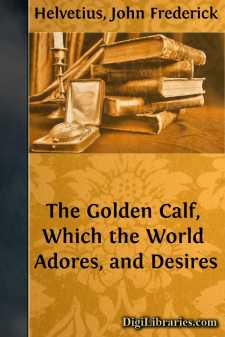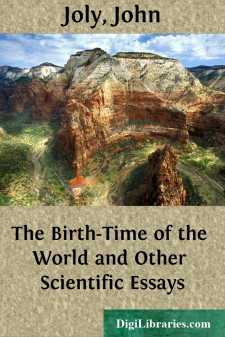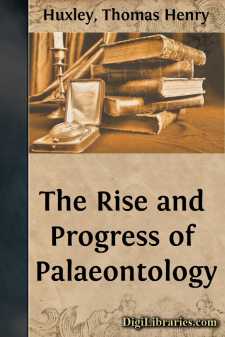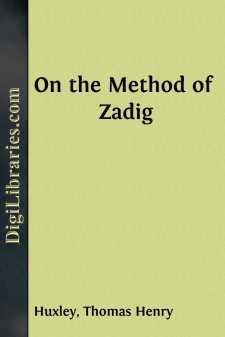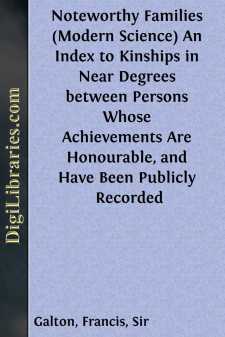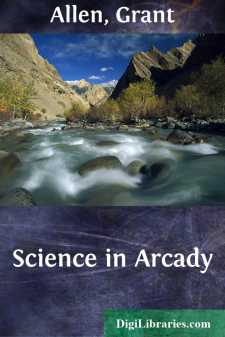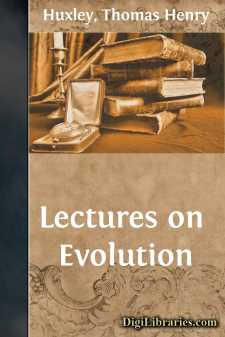Science
- Astronomy 18
- Biology 40
- Chemistry 13
- Electricity 1
- General
- History 6
- Light 1
- Paleontology 2
- Philosophy & Social Aspects 1
- Physics 3
- Relativity 2
- Study & Teaching 1
- Waves & Wave Mechanics 1
General Books
Sort by:
CHAP. I. Most Excellent, and Prudent Sirs. Before I enter upon the Description of the Philosophick PIGMY,(in this little Theatre of Secrets) overcoming and subduing GIANTS, I pray permit me here to use the words of Vanhelmont, taken out of his Book De Arbore Vitæ, fol. 630. and here Transcribed. I compelled to believe, that there is an Aurifick, and Argentick Stone. But (Friend of the Spagyrick Art) I...
more...
by:
Various
THE CAT. PART 1.walk´-ingthoughtknewsheathswatchedstrokedsmoothwon´-dergroundfore´-pawsyawnmis-take´shak´-ingtoesstretchedclaw1. Pussy came walking along the garden-path. Harry watched her, and saw that she did not like the damp ground. 2. She jumped over the pools, and then began to run, shaking her paws as she got to the house. 3. 'Now, a dog does not mind wet feet,' Harry thought;...
more...
by:
John Joly
PREFACE Tins volume contains twelve essays written at various timesduring recent years. Many of them are studies contributed toScientific Reviews or delivered as popular lectures. Some areexpositions of views the scientific basis of which may beregarded as established. Others—the greater number—may bedescribed as attempting the solution of problems which cannot beapproached by direct observation....
more...
That application of the sciences of biology and geology, which is commonly known as palaeontology, took its origin in the mind of the first person who, finding something like a shell, or a bone, naturally imbedded in gravel or rock, indulged in speculations upon the nature of this thing which he had dug out—this "fossil"—and upon the causes which had brought it into such a position. In this...
more...
Our fabulist warns "those who in quarrels interpose" of the fate which is probably in store for them; and, in venturing to place myself between so powerful a controversialist as Mr. Gladstone and the eminent divine whom he assaults with such vigour in the last number of this Review, I am fully aware that I run great danger of verifying Gay's prediction. Moreover, it is quite possible that...
more...
It is an usual and a commendable practice to preface the discussion of the views of a philosophic thinker by some account of the man and of the circumstances which shaped his life and coloured his way of looking at things; but, though Zadig is cited in one of the most important chapters of Cuvier's greatest work, little is known about him, and that little might perhaps be better authenticated than...
more...
by:
Francis Galton
Chapter I.—General Remarks. This volume is the first instalment of a work that admits of wide extension. Its object is to serve as an index to the achievements of those families which, having been exceptionally productive of noteworthy persons, seem especially suitable for biographical investigation. The facts that are given here are avowedly bald and imperfect; nevertheless, they lead to certain...
more...
by:
Grant Allen
About the middle of the Miocene period, as well as I can now remember (for I made no note of the precise date at the moment), my islands first appeared above the stormy sheet of the North-West Atlantic as a little rising group of mountain tops, capping a broad boss of submarine volcanoes. My attention was originally called to the new archipelago by a brother investigator of my own aerial race, who...
more...
I. THE THREE HYPOTHESES RESPECTING THE HISTORY OF NATURE We live in and form part of a system of things of immense diversity and perplexity, which we call Nature; and it is a matter of the deepest interest to all of us that we should form just conceptions of the constitution of that system and of its past history. With relation to this universe, man is, in extent, little more than a mathematical point;...
more...
INTRODUCTION The Great War has caused a vast destruction of the sounder portion of the belligerent peoples and it is certain that in the next generation the progeny of their weaker members will constitute a much larger proportion of the whole than would have been the case if the War had not occurred. Owing to this immeasurable calamity that has befallen the white race, the question of eugenics has...
more...


